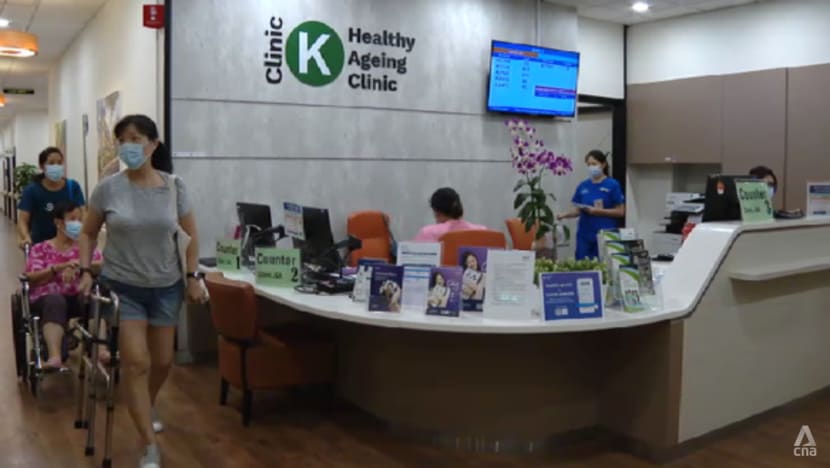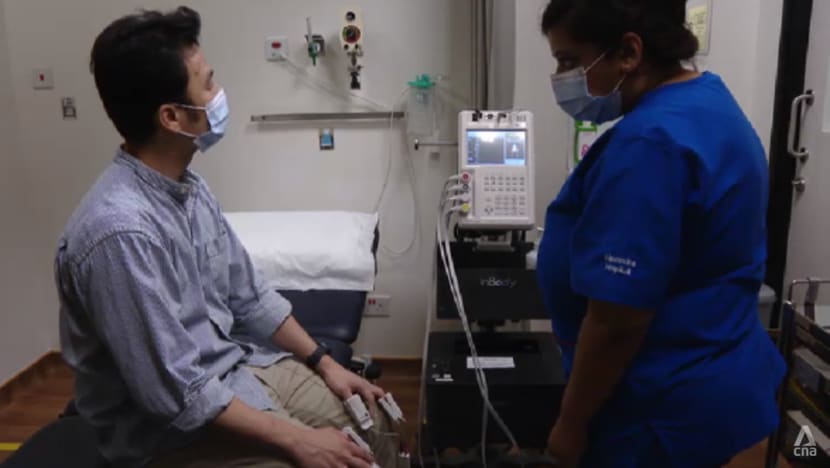
The Healthy Longevity Clinic at Alexandra Hospital.
A multidisciplinary team examines a patient's data, which can reveal how much an individual’s body is ageing, to develop tailored health plans.

The Healthy Longevity Clinic at Alexandra Hospital.
SINGAPORE: A clinic that aims to increase the healthy years of Singaporeans has opened its doors at Alexandra Hospital.
The Healthy Longevity Clinic – the first of its kind in the world involving a public hospital – is also studying and developing drugs that could slow the process of dementia.
Doctors at the clinic first interview an individual and conduct specific tailored investigations with various tests which can include those for blood, epigenetics, and gut microbiota.
Healthcare teams then examine a patient's health data, which can reveal how much a person’s body is ageing, to develop individualised health plans.
“A multidisciplinary team consisting of not just physicians, but also exercise physiologists, dietitians, health coaches and researchers will get together to come up with a specific and individualised health care plan for each patient,” said Dr Grace Chiang, a longevity clinician at the clinic.
“It could get as specific as which muscle groups an individual should focus on, which would determine the kind of exercise they should do and for how long,” Dr Chiang told CNA938’s Asia First on Monday (Sep 4).
Assessment will be done between six and 12 months, and could go up to two years. The service is for patients between 35 and 70 years old, who have no more than one chronic disease.
“We all know that the ageing process starts very early from the age of 20 or 25. We see that we deteriorate in terms of function and how we look,” said Prof Andrea B. Maier, director of the National University Health System’s (NUHS) Centre for Healthy Longevity.
“At the age of 35, we really can measure how old somebody is. So that's a reason why we are focusing on individuals at a middle age to really prevent the onset of age-related diseases.”
The consultation, tests and healthcare plans range in total from about S$1,500 to S$4,000.

The initiative is part of efforts to focus on preventive care as Singapore's population rapidly ages.
“Singapore has one of the longest life expectancies in the world. Our health-associated life expectancy has increased and so lifespans and healthy spans have also increased, but the gap remains the same,” said Professor Kenneth Mak, the Ministry of Health’s (MOH) Director-General of Health.
He was referring to a gap between lifespan and health span. Lifespan is the number of years lived, while health span is the number of healthy years without any chronic or debilitating disease.
Currently, the gap for Singaporeans is at around 10 to 11 years, which means a decade of living in ill health, said Prof Mak.
“This is what we want to adjust and change. It's not just increasing the number of years we live, it's the number of healthy years that we want our citizens to live. We also want to narrow that gap, so that we have less years in ill health.”
The clinic hopes to increase the number of healthy years for individuals by three years.
Mr Eric Chua, Senior Parliamentary Secretary for Culture, Community and Youth and Social and Family Development, said during the clinic’s opening last Thursday: “By embracing advances in medical science, diagnostics, and interdisciplinary collaboration, this clinic offers personalised approach to longevity, one that doesn't just focus on the quantity of years, but also, perhaps more importantly, the quality of life those years afford us.”
The clinic's location at a public hospital helps to provide seamless and continuous care to patients.
“(The location) is significant because when we are at a public hospital. When an individual comes in for these investigations and tests, we might find a disease or a comorbidity. We will be able to discuss with fellow specialists in the same hospital, so it is all under one roof,” said Dr Chiang.
Another benefit is that the clinic shares the same site as the NUHS Centre for Healthy Longevity research unit.
Launched last September, the unit develops new treatments for longevity. It hopes to make such medication accessible and affordable for all.
“Trying to obtain funding to bring down the cost is going to be a challenge. We are going to work with our advocacy partners and our stakeholders (on this),” said Dr Laureen Wong, director of the clinic.
“We'll be doing a lot of health programme evaluation and research, writing grants, trying to prove our cost effectiveness and of course, our clinical efficacy and then we will go to the ministry and we'll try to see if we can get subsidies for all Singaporeans.”
Clinical trials involving nutritional supplements started last year, and the team is also looking to test the use of existing drugs for other conditions.
It is all part of larger plans to help Singaporeans not just live longer, but to make those added years count.